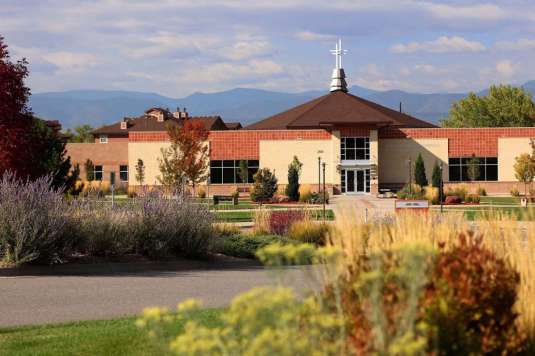i just got back from a wonderful and energizing campus visit at Denver Seminary. Along with a tour and a chat with an admissions counselor, i was able to attend part of a class and have lunch with a professor, and those two items on this morning’s agenda have left me more eager than ever to start school this fall.
The class i was able to attend was the first semester of Biblical Hebrew. It went a mile a minute and was conducted in a mixture of English and Hebrew, and i think i was grinning ear to ear the entire time. Yes, languages are going to be a new challenge for me, and i was a bit apprehensive about the three and a half years of language study i’ll have to do, but—the class was fun. Despite the disorientation and quick pace, the class was relaxed and the professor, and by extension the students, were having a good time. For the first time, i thought, i can do this. i even learned a few things while in the class—i was able to puzzle out two of the Hebrew names across the room from us, and learned a little something about—what else?—the grammar of Hebrew storytelling. (Start with perfect tense; continue in narrative preterite.)
The admissions ninjas (seriously, that’s what they call themselves) over at DenSem paired me up with the best OT professor they could have picked. Dr. M. Daniel Carrol R. is one of three full-time Old Testament professors, and over lunch we discovered a lot of common ground. He was raised Catholic and now attends an evangelical Anglican congregation (i have at times called myself “half Catholic” and often wonder how long it’ll take me to end up in a liturgical church of some sort). He studied English in college, and has a deep love of literature and Dickens in particular (i am a bibliophage and librarian who plans to pursue an English or literature degree after this OT degree, and i love A Tale of Two Cities). Dr. Carroll teaches OT classes from a narrative rather than historical background focus (being a writer and a narrative-lover who wants to study the OT in order to undergird my fiction-writing, this makes my heart leap!). He’s active in immigration reform (i am very concerned about the issue of human trafficking and plan to focus on immigration next year in the library, as those two issues go hand-in-hand), and, being from Guatemala, is very focused on 2/3 world culture and social ethics (one of my favourite classes during my undergrad involved reading William T. Cavanaugh’s Torture and Eucharist, about the disappearings in Chile; this was formative in developing my understanding that we Western Christians should not consider our perspective normative in Scripture interpretation).
One of the things i wanted to talk about during this visit was whether OT or Theology would be a more appropriate major for me, and while i was leaning toward OT, i was not 100% certain of that decision. i am now. Meeting Dr. Carroll was certainly the highlight of this trip. Jonathan has read his most recent book (Christians at the Border), and based on what he has told me i was already very eager to meet him, but i was surprised at how much we have in common. The other OT professors (one who focuses on Hebrew language studies and Messianic Judaism, and one who is primarily interested in Ancient Near East subjects) both will be wonderful, but i think i’ve found “my professor.” When i told him how i love the OT and the way G-d reveals Himself there, he said he hoped to see more students with that perspective. And when we met up with my admissions counselor after lunch, Dr. Carroll said he’d found a kindred spirit regarding the literary mindset. So i think we are simpatico. 🙂
Other things i was able to discuss with my admissions counselor included how i’d go about doing a double major (in case i want to add a lot of theology on top of my OT degree) and how i might be able to swap out some of the basic doctrinal surveys or other classes with more specific theology courses. (i’ve taken a lot of theology, and i do have a ton of Bible courses under my belt, so testing out or just plain swapping courses might give me a bit more wiggle room to take more electives. And i do love electives.) Unfortunately, i misread the course sequence for the OT major and didn’t realize that Anthropology and Soteriology, the elective i’m most interested in, is a theology class rather than an OT class, so it won’t qualify for my one elective slot. But i think i can work it in anyway—i really want to take that one. Dr. Carroll also mentioned that a hamartiology (theology of sin) class might be doable, and that sounds like something that would be very helpful given the questions i have about how to answer the problem of sin in a pre-Christian setting. Actually—having my elective slot open again means i might be able to take both semesters of Akkadian, and get to do a study of Gilgamesh. That would be awesome—but i probably ought to look the course catalog over again and see how Hebrew takes before deciding anything. Although i’d love to study Gilgamesh in the original Akkadian. (Wow, i’m a nerd.)
Now what remains is to follow up with one outstanding reference, and fill out my application for major (i’d been putting that off until after talking with someone in more depth).
i love this. i can’t wait.
